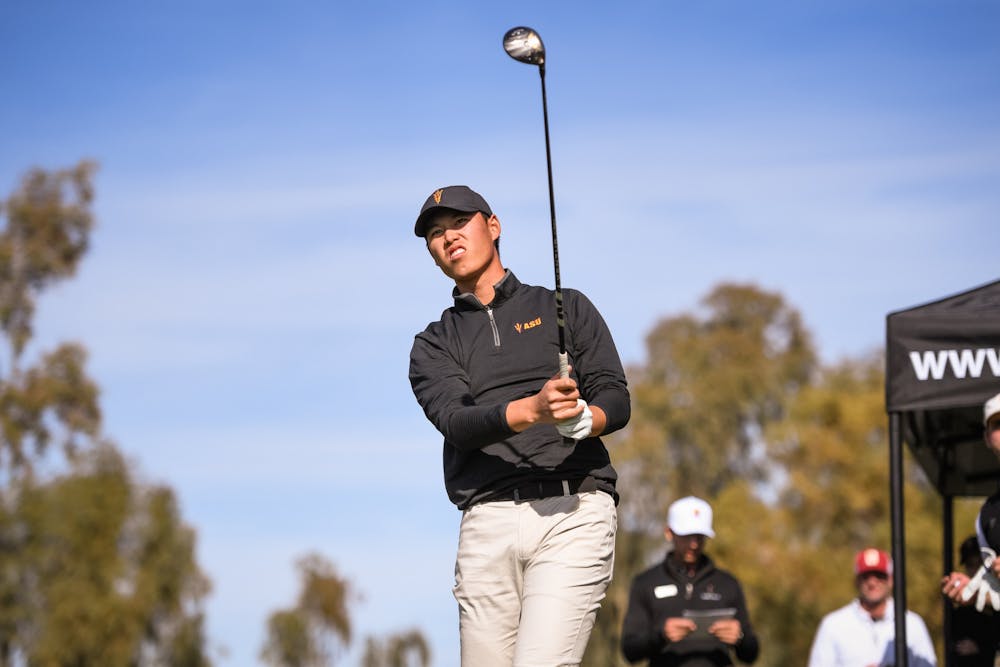In recent years, athletes have given greater focus to the mental preparation of their sport. However, some sports require more mental strength than others.
Golf is a great example of that. However, one of the ASU-affiliated sports psychologists, Marc Strickland, said that golf is not the only sport that requires ample mental and physical preparation.
"It is easy to look at sports like golf and tennis and say that there is a big mental aspect to success in those sports because success is based on that one athlete executing at a high level in challenging situations," Strickland said. "However, there is a mental element to all sports."
Strickland's example of the mental element found in all sports was the pressure of a championship game.
"If you look at events such as the NCAA basketball tournaments, or the Olympic games, or national championships," Strickland said. "Often teams are so evenly matched it comes down to which team handles the pressure in the moment and does not make that critical mental mistake."
While Strickland said that all sports have mental elements to them, he also acknowledged that both golf and tennis require the mental fortitude to succeed while under pressure.
As mental health is more commonly discussed in sports media, athletes have expressed their use of sports psychologists and assistance programs. Athletes like Kobe Bryant and Nathan Mackinnon, to name a few, have both publicly discussed their belief in the practice.
According to Strickland, sports psychology is very important to the success of athletes.
"It helps athletes focus on the importance of the mental wellness needed to achieve peak performance," Strickland said. "By developing strong mental skills, athletes can develop the ability to manage the stress of competition and learn how to perform under pressure."
One of golf's biggest challenges for athletes is performing under pressure.
As golfers approach a difficult shot, they have to compose themselves and perform at their best. Graduate student Ryggs Johnston talked about his pre-shot mental routine.
"I think we all try to instill confidence in ourselves," Johnston said. "Regardless of where it's at, you convince yourself that you can go out and win."
However, it can take a while to create a routine to instill confidence in younger athletes, especially when they are in a prestigious program like ASU golf. Associate head coach Thomas Sutton said that confidence is something that these younger athletes often struggle with.
"Every one of our players comes from a location in the world where they are the best," Sutton said. "When they come to a school like this where we've gathered the top from all over the world, they realize they might be number eight."
For freshman Connor Williams, college life was something he had to adapt to. Williams said that coming into such a new place was a difficult transition for him.
"It's tough to adapt to such a different place," Williams said. "Being around the best players in the world, you have to get comfortable with everyone and get into your role. I feel like it took me a little longer than I wanted to do that."
Williams was never in the starting five during his first semester. He only played in individual events like the Ben Simpson Collegiate with a few of his fellow Sun Devils. Williams said that his performance at the Oregon State Invitational, where he tied for 17th, was a wake-up call for him.
"I played an individual event while the team was somewhere else," Williams said. "It was in Oregon State. I played terribly, and one of my teammates actually won. That was a pretty big wake-up call for me. I knew I needed to change some stuff."
Since his performance in Oregon, Williams has appeared in the starting five four times. He only hit over par once, at the Cabo Collegiate Invitational in early March.
Williams decided to change his practice habits to achieve his peak performance. He said that his teammates were a big help while he was struggling earlier in the season.
"We have five freshmen," Williams said. "It's pretty easy to form your own little clique with them. We're hanging out with each other all day and all night. I tried to get more comfortable with the upperclassmen. Once I did that and started to practice with them more, it gave me more confidence."
One of the upperclassmen Williams spoke of is Johnston, who has been a Sun Devil for five years.
Having played so many tournaments with ASU clubs, Johnston knows what it's like to be in Williams' shoes, and said that his previous upperclassmen helped him grow his confidence during his own first year.
"When you get to play as many tournaments as I've played, you kind of learn what works and what doesn't," Johnston said. "When I was a freshman like Connor, it helped a lot to have really experienced, older team members helping me out."
While both Williams and Johnston have attributed some of their mental success to their teammates, Sutton said that the players credit the sports psychologists as well.
"It's different for every guy," Sutton said. "I know some of our freshmen have used them more often."
Sutton also discussed the psychologists' philosophies and how they fortify the players' mental game.
"Everybody has a different message," Sutton said. "The women’s team has someone the guys can see. There are a lot of golf-specific psychologists out there. I’d say most of them read the books for golf-specific stuff, or they listen to a podcast. But then some will meet with a guy probably once or twice a month."
While athletes have their own ways of improving their mental focus, the NCAA is bringing a wealth of resources to athletes like Williams to aid in their college careers.
"The NCAA has really taken a proactive approach to sports psychology and mental health over the last 10 to 15 years," Strickland said. "Athletes can access sports psychology services in a variety of formats, including individual sessions with a sports psychologist, team mental skill sessions and specialized groups."
Edited by Alfred Smith III, Sadie Buggle and Caera Learmonth.
Reach the reporter at Gbarberi@asu.edu and follow @Giobarberio1 on X.
Like The State Press on Facebook and follow @statepress on X.
Giovanni is a sophomore studying history. This is his third semester with The State Press.




